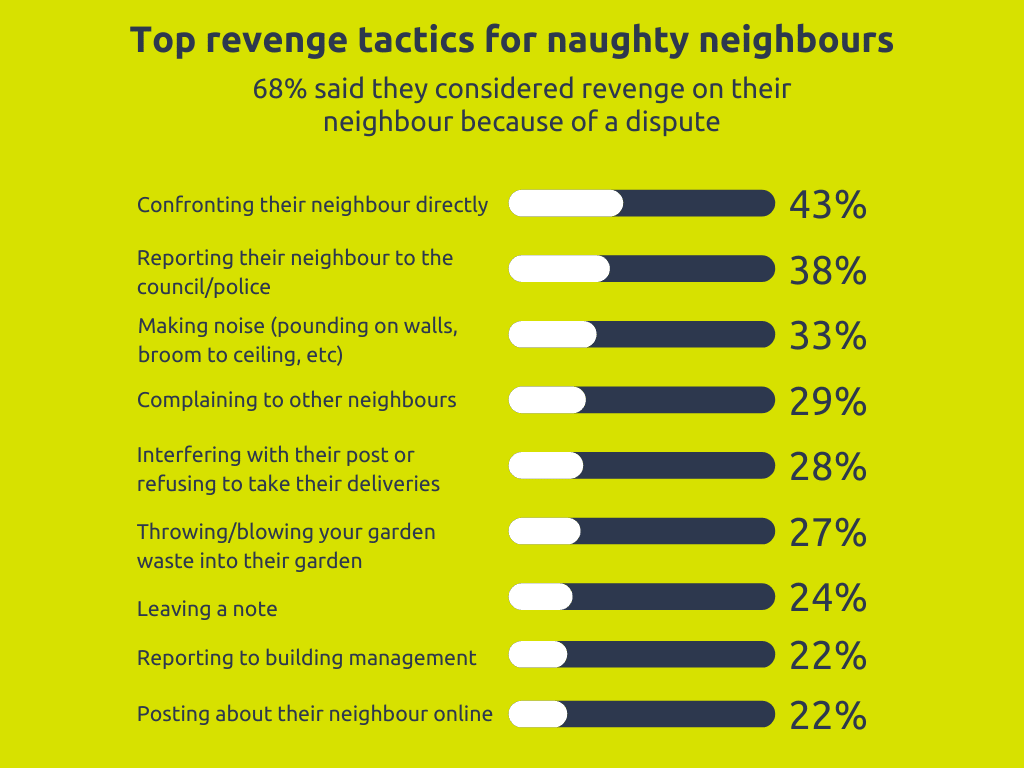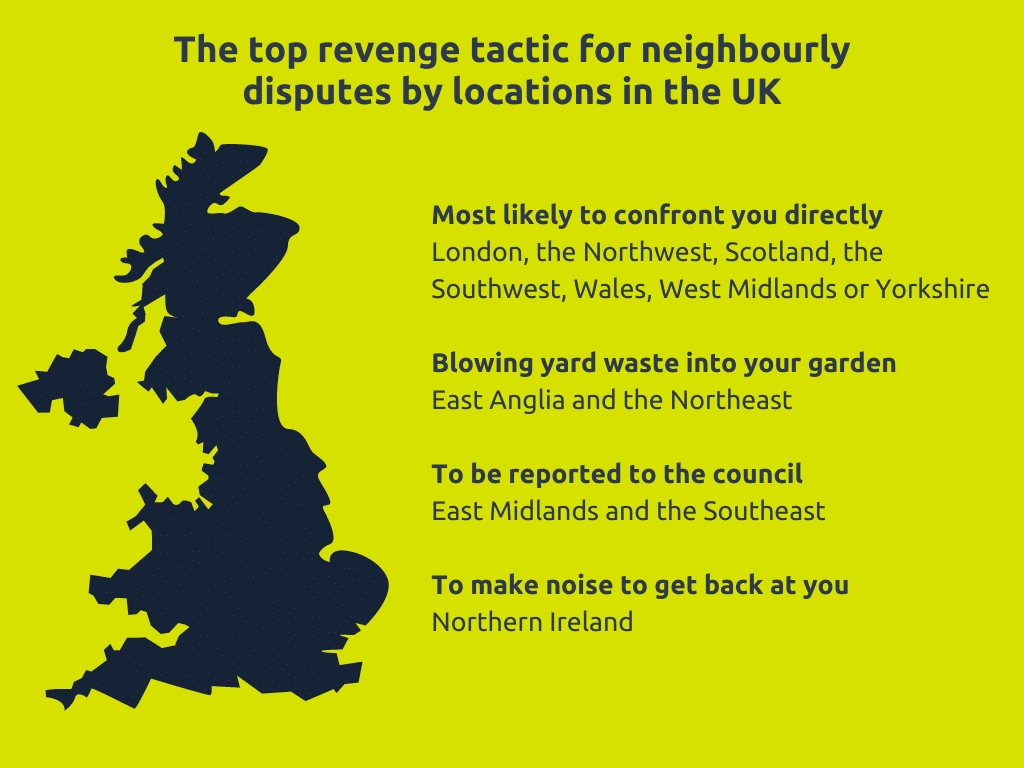Your relationship with your neighbours can have a huge impact on the quality of your life. Great neighbours make your life so much easier and immediately make you feel more comfortable at home. Bad neighbours, on the other hand, can transform what was once an amazing home into a place you can’t wait to get away from.
In fact, for a number of years, people coming to our sell house fast experts have cited problem neighbours as one of their number one reasons for selling. After noticing this trend, we surveyed 2,000 UK homeowners to establish just how many of us have disputes with neighbours and what causes neighbourly disputes. Alongside this, we also looked at how many decided to take matters into their own hands and exact revenge on their bad neighbours.
So how many of us are currently planning to get revenge against bad neighbours? And what’s the most popular method of getting revenge?
Why are neighbour disputes so common?
Overall, our survey revealed a massive 60% of UK adults have had a dispute with their neighbour, and that dispute resulted in lasting negative feelings between the neighbours. The top reason for disputes across the country was unanimous: people being too noisy at anti-social hours.
The top reasons our respondents cited for falling out with their neighbours are:
- Being too noisy at anti-social hours
- Impolite behaviour
- Property boundary dispute
- Parking dispute
- Invade privacy/ watch you
- Argument over pets
- Dispute about outside space
- Misbehaviour in common area
- Conducting illegal activity
- Littering
- They accused me of stealing
- Neighbour called police on me
- Other – please state
- N/A – nothing in particular
- Prefer not to say

Noisy neighbours law 11pm
Unless you live in a detached property surrounded by land, the chances are you have experienced unwelcome noise from your neighbours. Usually it’s a one off; sometimes your neighbour may give warning or apologise. However, recurrent unreasonable noise – particularly at night – understandably needs addressing.
Noise disturbance is one of the most common anti-social behaviours reported to local authorities and police. You can report noisy neighbours to the environmental health department of your local council, and they will also be able to decide whether the issue needs escalating further. Typically, the council will issue warning notices to noisy neighbours. This document will contain the following details:
- The noise is coming from the premises between 11pm and 7am
- The noise exceeds, or may exceed permitted levels as measured from within the complainant’s dwelling
- The noise must be reduced to below the permitted level in a specified period
- The time the notice is issued
It is recommended that residents struggling with noisy neighbours collect evidence. Make a not of dates, times, a description of the noise, and how it makes you feel. Video or sound recordings are also helpful. This can all be given to your council contact or local police force.
Boundary dispute with neighbour
There are 4 common types of boundary disputes:
- Plot line and party wall
- Fence and landscaping
- Access
- Adverse possessions
Regardless of which the neighbour disagreement is over, the longer it carries on the more acrimonious the situation becomes. It’s not uncommon to access the Land Registry for the property title deeds. Often the land registry plan does not normally determine exactly where the boundaries lie. Instead, you need to obtain the pre-registration deeds for both properties.
It’s easier said than done, particularly when tensions are high between neighbours, but getting together to examine deeds is helpful. You will need to look for land transfer documents, boundary paperwork, or land division notices. It is not unusual for documents to be of varying quality, and it can sometimes require the expertise of a land surveyor to settle the dispute once and for all.
Neighbour parking disputes
Conflicts regarding parking are one of the most common disputes between neighbours. If you have your own driveway, you’re safe. Issues tend to arise when there is a shared residential carpark or parking is on-street only.
As long as a vehicle is taxed and is not breaching any traffic laws, cars can be parked anywhere on a public highway. Whilst this is the law, it is parking etiquette that is often the cause of neighbourly quarrels. Whilst there are rules and regulations in the Highway Code, when it comes to on-street parking, common decency and courtesy is suggested. However, it is worth understanding that on a public highway a vehicle can park wherever it wants if not breaking the Highway Code. This may include right outside your house!
Neighbour tree disputes
Who knew that hedges and trees could cause serious arguments? Is a hedge too high? Are branches hanging over your garden? Flora and fauna can cause serious disagreements between neighbours, despite the issue being crystal clear. Most neighbours abide by the rule that should the roots or trunk of any plant reside on their land, they’re responsible for maintaining it. However, things can get tricky when land boundaries are unclear, or hedges and trees span two gardens due to growth over time.
How to get revenge on bad neighbours
Surprisingly, of the 60% of people who have had bad neighbours, a massive 68% of people have considered revenge on their neighbour as a result of a dispute, and our favoured revenge tactic is direct confrontation.
The top revenge tactics nationally are:
- Confronting them directly
- Reporting them to the council/police
- Making noise (pounding on walls, broom to ceiling, etc)
- Complaining to other neighbours
- Interfering with their post or refusing to take their deliveries
- Throwing/blowing your garden waste into their garden
- Leaving a note
- Reporting to building management
- Posting about them online
- Stealing/blocking their car park spot

The top revenge tactics by region
While direct confrontation is the preferred method of dealing with problem neighbours, there are variations around the country. The most popular tactic, direct confrontation, is the most popular in:
- London
- North West
- South West
- Wales
- West Midlands
- Yorkshire and the Humber
However, if you’re in East Anglia or the North East, your neighbour will most likely take their revenge by blowing waste into your garden. In the East Midlands and the South East, you can expect to be reported to the council, while in Northern Ireland, you can expect your neighbour to make noise to get back at you – like pounding on the wall or taking a broom handle to the ceiling.

Resolving disputes with neighbours
Seeking revenge might seem like an ideal solution in the heat of the moment. However, this back and forth can escalate conflict further. Talking is the preferred solution, but we understand that not every neighbour is open to conversation and compromise, which can really affect your quality of lifelong term. It is not uncommon for many people, particularly those who live alone to feel isolated, threatened, or scared when neighbours won’t help find a solution or get become volatile.
If you have tried resolving the situation verbally, to no avail, below are the best points of contact:
- Rented property – landlord
- Social housing – council or housing association
- Homeowner – local council, Citizen’s Advice, solicitors
Should a dispute with a neighbour ever result in threatening behaviour, or verbal or physical abuse, you should call the police.
Methodology: A survey of 2,000 U.K. adults was carried out by One Poll in collaboration with WeBuyAnyHome.


















